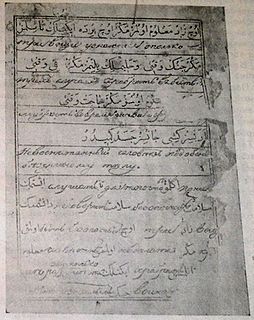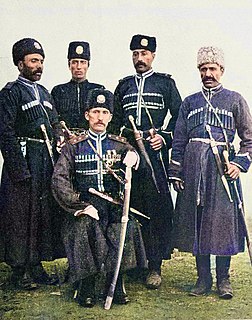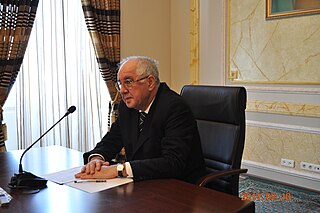Literature of Azerbaijan primarily refers to Azerbaijani literature, or Azeri language literature. It could also refer to:
- Persian literature from Azerbaijan
- Arabic literature from Azerbaijan
- Russian literature from Azerbaijan
Literature of Azerbaijan primarily refers to Azerbaijani literature, or Azeri language literature. It could also refer to:

Azerbaijan, officially the Republic of Azerbaijan, is a country in the Caucasus region of Eurasia. Located at the crossroads of Eastern Europe and Western Asia, it is bounded by the Caspian Sea to the east, the Russian republic of Dagestan to the north, Georgia to the northwest, Armenia and Turkey to the west, and Iran to the south.
Western may refer to:
Mayan most commonly refers to:

Azerbaijani or Azeri, also referred to as Azerbaijani Turkish, is a Turkic language spoken primarily by the Azerbaijani people, who live mainly in the Republic of Azerbaijan where the North Azerbaijani variety is spoken, and in the Azerbaijan region of Iran, where the South Azerbaijani variety is spoken. Although there is a very high degree of mutual intelligibility between both forms of Azerbaijani, there are significant differences in phonology, lexicon, morphology, syntax and sources of loanwords.
Azerbaijani may refer to:

Turkmen, also referred to as Turkmen Turkic or Turkmen Turkish, is a Turkic language spoken by the Turkmens of Central Asia, mainly of Turkmenistan, Iran and Afghanistan. It has an estimated five million native speakers in Turkmenistan, a further 719,000 speakers in Northeastern Iran and 1.5 million people in Northwestern Afghanistan. Turkmen has official status in Turkmenistan, but it does not have official status in Iran or Afghanistan, where big communities of ethnic Turkmens live. Turkmen is also spoken to lesser varying degrees in Turkmen communities of Uzbekistan and Tajikistan and by diaspora communities, primarily in Turkey and Russia.
Nizami may refer to:

Azerbaijanis or Azeris (آذریلر), also known as Azerbaijani Turks, are a Turkic ethnic group, living mainly in the sovereign Republic of Azerbaijan and the Azerbaijan region of Iran, with a mixed cultural heritage, including Turkic, Caucasian and Iranian elements. They are the second-most numerous ethnic group among the Turkic-speaking peoples after Turkish people and are predominantly Shia Muslims. They comprise the largest ethnic group in the Republic of Azerbaijan and the second-largest ethnic group in neighboring Iran and Georgia. The world's largest number of ethnic Azerbaijanis live in Iran, followed by the Republic of Azerbaijan. They speak the Azerbaijani language, belonging to the Oghuz branch of the Turkic languages.

Azerbaijani literature is written in Azerbaijani, a Turkic language, which is the official state language of the Republic of Azerbaijan, where the North Azerbaijaini variety is spoken, and is the first-language of most people in Iranian Azerbaijan, where South Azerbaijani is spoken. While the majority of Azerbaijani people live in Iran, modern Azerbaijani literature is overwhelmingly produced in the Republic of Azerbaijan, where the language has official status. Three scripts are used for writing the language : Azerbaijani Latin script in the Republic of Azerbaijan, Arabic script in Iranian Azerbaijan and Cyrillic script in Russia.
Kazakh, Qazaq, Kazakhstani or Khazak may refer to:

Firidun bey Ahmad bey oglu Kocharli or Kocharlinski was a prominent Azerbaijani writer, philologist and literary critic.

An ashik or ashugh is traditionally a singer-poet and bard who accompanies his song—be it a dastan or a shorter original composition—with a long-necked lute in Turkic, as well as non-Turkic cultures of South Caucasus. In Azerbaijan, the modern ashik is a professional musician who usually serves an apprenticeship, masters playing the bağlama, and builds up a varied but individual repertoire of Turkic folk songs.

Mirza Fatali Akhundov, also known as Mirza Fatali Akhundzade or Mirza Fath-Ali Akhundzadeh, was a celebrated Iranian Azerbaijani author, playwright, ultra-nationalist, philosopher, and founder of Azerbaijani modern literary criticism, "who acquired fame primarily as the writer of European-inspired plays in the Azeri Turkic language". Akhundzade singlehandedly opened a new stage of development of Azerbaijani literature. He was also the founder of materialism and atheism movement in the Republic of Azerbaijan and one of forerunners of modern Iranian nationalism. He wrote in Azerbaijani, Persian and Russian.
Nagorno-Karabakh war may refer to:
The Mirza Fatali Akhundov National Library of Azerbaijan is the national library of the Republic of Azerbaijan, located in Baku and founded in 1922. It is named after Mirza Fatali Akhundov, an Azerbaijani dramatist and philosopher. The library is located on Khagani Street and overlooks Rəşid Behbudov Avenue and Nizami Street. Its facades feature the statues of various writers and poets: Nizami Ganjavi, Mahsati, Uzeyir Hajibeyov, Shota Rustaveli, Alexander Pushkin and several others.

The Qarapapaqs or Karapapaks are a Turkoman sub-ethnic group of Azerbaijanis who mainly live in Azerbaijan, Iran, Georgia, and in the northeast of Turkey near the border with Georgia and Armenia, primarily in the provinces of Ardahan, Kars and Ağri. The exact number for the Qarapapaq population worldwide is unknown but is likely to be in the hundred thousands.
Baba Punhan, born Atababa Seyidali oglu Madatzadeh, , was an Azerbaijani poet.
Babayev or Babaev is a Russian, Ukrainian, Uzbek and Azerbaijani masculine surname that comes from Turkic languages; its feminine form is Babayeva or Babaeva. The word babay (бабай) means "grandfather" or "old man" in Tatar and Bashkir. Alternatively, it comes from Arabic word "bab" which means "door". There used to be a name "Babullah" which meant "door of God" or "door of heaven". It was very popular between Turkic nations before USSR. Grandchildren of Babs got "Babayev" surname. At the first stages it used to be "Babov", but later it became "Babayev" with the effect of Russian phonetics. The surname may refer to:

Hidayat Khudush oglu Orujov is a notable writer and an Azerbaijani politician became the Chairman of State Committee for Work with Religious Organizations of Azerbaijan Republic in 2006 and is currently serving as the Azerbaijani ambassador to Kyrgyzstan.
Nakhchivan or Nakhichevan may refer to: